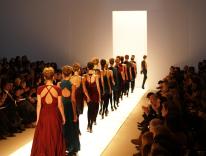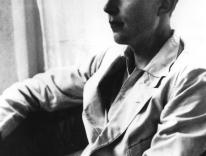 On the last day before the conclave, most observers have concluded that there is no clear favorite to succeed Benedict, with this pronouncement from Andrea Gagliarducci perhaps summing things up: Now more than ever, each cardinal has approximately the same odds of becoming Pope. Not that that stops anyone from continuing to float the possibilities (welcome to the Top Ten, Peter Erdo), or from identifying emerging coalitions (more cardinals are backing Scola. No, Ouellet. Scherer?). Or from touting Americans.Or from simply breaking it down to a battle between the Romans and the reformersor between the curia and the world. All of which means its probably best to heed the reminder from Mexican Cardinal Norberto Rivera Carrera on Sunday, after he celebrated Mass at his titular church of San Francesco di Ripa Grande: Its not journalists that vote in the conclave. Its cardinals.One prediction likely to bear out: Vatican spokesman Francisco Lombardi sees black smoke on the horizon for Tuesday. Meteorologists see rain, for Tuesday and beyond. PaddyPower puts the odds of atwo-day conclave at 2:1 but is also taking bets on an Ides of March election.Regardless of who becomes pope, writes John Allen, his first days are likely to offer clues as to the kind of papacy that will follow:
On the last day before the conclave, most observers have concluded that there is no clear favorite to succeed Benedict, with this pronouncement from Andrea Gagliarducci perhaps summing things up: Now more than ever, each cardinal has approximately the same odds of becoming Pope. Not that that stops anyone from continuing to float the possibilities (welcome to the Top Ten, Peter Erdo), or from identifying emerging coalitions (more cardinals are backing Scola. No, Ouellet. Scherer?). Or from touting Americans.Or from simply breaking it down to a battle between the Romans and the reformersor between the curia and the world. All of which means its probably best to heed the reminder from Mexican Cardinal Norberto Rivera Carrera on Sunday, after he celebrated Mass at his titular church of San Francesco di Ripa Grande: Its not journalists that vote in the conclave. Its cardinals.One prediction likely to bear out: Vatican spokesman Francisco Lombardi sees black smoke on the horizon for Tuesday. Meteorologists see rain, for Tuesday and beyond. PaddyPower puts the odds of atwo-day conclave at 2:1 but is also taking bets on an Ides of March election.Regardless of who becomes pope, writes John Allen, his first days are likely to offer clues as to the kind of papacy that will follow:
The first bit of business for the new pope usually comes on the second day after his election, when its customary to reconfirm the heads of Vatican offices who temporarily lost their jobs during the interregnum. This time, if the new pope doesnt issue that order right away, it could be the first hint that the cardinals got their wish for someone who truly intends to clean house in the Vaticans bureaucracy.
Noting the confluence of International Womens Day and the gathering of cardinals in Rome, Elizabeth Drescher uses Cardinal Ouellets characterization of womens status in the Catholic church as a secondary concern to examine how welcome women really are in Christian churches across the denominational spectrum. Meanwhile, Vatican Insider features a lengthy report on women and the conclave, with in-depth testimonies from a number of women religious, including Sister Maria Barbagallo, General Superior of the Missionaries of the Sacred Heart of Jesus:
If I had been able to talk during the congregations, I would have said that women are essential to the new evangelization started by Benedict XVI We feel we are a living part of the Church even when our role is recognized. Women are freer from powers and special interests. We do not chase after positions of power. I would have wanted to say to the cardinals that women in the church can do more. [I]f there were women in positions of power there would be fewer scandals in the church, whether child abuses or Vatileaks.
Writing at the First Things blog, Seth Chalmers posits what he says is a realistic agenda for Catholic-Jewish relations once the new pope is elected. Excerpts follow, but read it in its entirety here.
Different organizations will highlight different issues: Some Jewish leaders will be most concerned with anti-Semitism, Vatican relations with Israel, and the Israeli-Palestinian conflict; others will focus on interfaith dialogue on theology and history; others will discuss social and economic policy, and the place of religion in politics and the public square. But whatever concerns are mentioned, this much is certain: The organized Jewish community will present a long wish list to the chief cleric of a religion in which it does not believe. We in the Jewish community should resist the urge to tell Christians how to be Christian. To do so is neither valid interfaith dialogue, which respects the other groups right to define its own beliefs, nor valid proselytism, which is honest enough to seek the other partys conversion forthrightly. Instead of lecturing the new pope on how best to be Catholic, Jews should identify the maximum we can reasonably ask from the Catholic Church, without asking it to stop being the Catholic Church.
The Christian Science Monitor asks how much you really know about the Catholic Church, with a twenty-five question eve-of-conclave quiz. Contestants are asked (among other things) to name the maker of the current pope-mobile and the city--outside Vatican City--that is home to the greatest number of holy relics (the answer to the latter may, as they say, surprise you).


